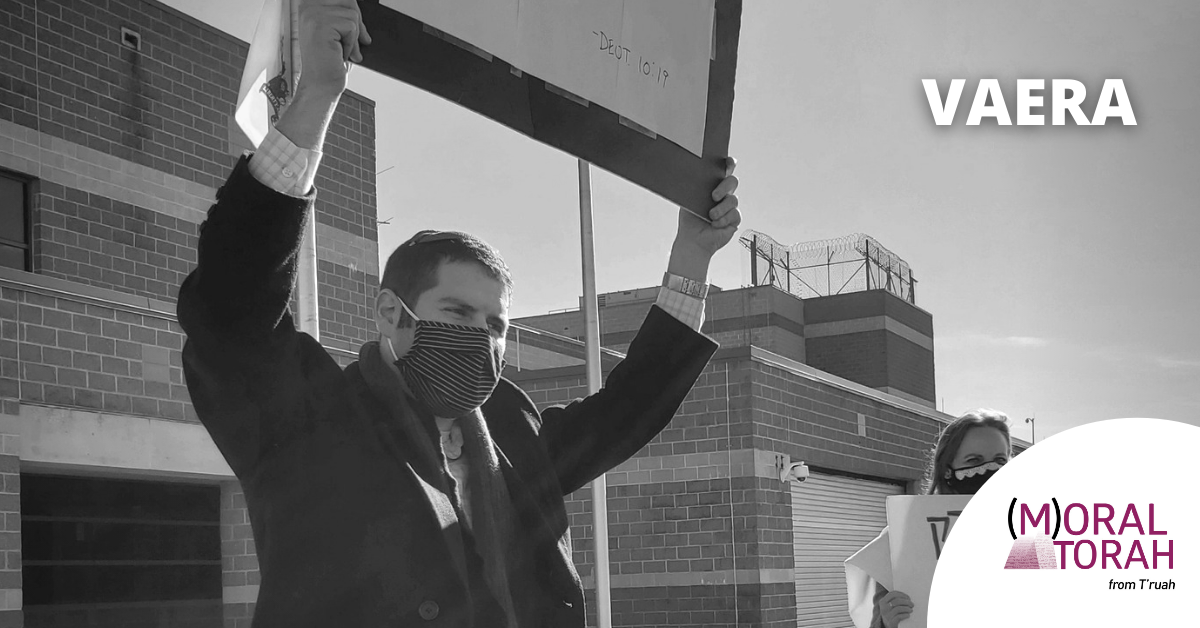A D’var Torah for Parshat VaEra by Rabbi Dr. Oren Z. Steinitz
“Just as it is a mitzvah for a person to deliver a message that will be heard, so is it a mitzvah for a person not to deliver a message that will not be heard.” (Babylonian Talmud, Yevamot, 65b).
This statement, attributed to Rabbi Elazar ben Shimon, is often challenging for activists, and anyone with strong opinions. Often quoted in the context of the mitzvah of tochecha, ”rebuke,” the Gemara basically tells us that even if you know that you are right, sometimes, probably more often than you think, there is no point in opening your mouth. When you are faced with people who have no intent to listen, it is preferable to remain silent rather than cause more antagonism towards your cause. Rebuke is important, the rabbis tell us, but it is equally important to know when, where, and how to deliver it.
Sign up to receive Moral Torah in your inbox each week.
The days and weeks following the November elections provided us with a fantastic example of this situation. I kept asking myself: How is it possible that so many people were seemingly fine with supporting a regime that showed nothing but contempt for human rights; an administration that sympathized with white supremacists, that put children in cages, whose criminal disregard for scientific evidence cost thousands of human lives? Especially puzzling was the fact that the administration actually increased their support among populations that suffered from their policies the most. Why was our message not heard? Where were all those people during these last four years? Can’t they see that they are acting against their own best interests? “It should not have been this close,” people kept telling me.
Parshat VaEra may clue us in to why our message seems to be falling on deaf ears.
At the beginning of the portion, God tells Moses to go to the Israelites, and remind them of the promise made to their ancestors — God will free them from the labor of the Egyptians and bring them to the Land promised to Abraham, Isaac, and Jacob. Moses does what he was told and goes on to deliver the message to the Israelites. However, despite the fact that this should have been joyful, promising news of a real change, his words are not heard; the Israelites ignore him.
The Torah does not leave us in the dark regarding the reason for Moses’ lack of success, telling us that the Israelites did not listen due to “kotser ruach v’avodah kasha,” a phrase which the JPS translates as “their spirits crushed by cruel bondage” (Ex. 6:9). While the JPS translation certainly makes sense, a more direct translation would be “due to their impatience caused by hard labor.” Rashi, the eleventh century biblical commentator, goes even further and interprets the phrase “kotser ruach” to literally mean “shortness of breath.” The Israelites worked so hard, he tells us, that they simply could not breathe. Nobody will take the time to listen to your message, negative or positive, when they are literally gasping for air.
We all know that Moses has the Israelites’ best interests in mind. We all know that he is an Israelite himself. But as far as the Hebrew slaves are concerned, he is an outsider; a “functionally-Egyptian” prince who grew up in Pharaoh’s palace with a silver spoon in his mouth. He may have Hebrew blood flowing in his veins, but at the end of the day, he grew up benefiting from his fellow tribesmen’s hard work and crushed spirit. He may have loads of good intentions, but he is not the one who is out of breath.
Find more commentaries on Parshat VaEra
Only four verses later (Ex. 6:13), God once again commands Moses and Aaron to approach the Israelites, as well as Pharaoh, and tell them that God will deliver them out of Egypt. What changed? Why bother repeating a message when it was already rejected? Rabbi Meir Simcha of Dvinsk (d. 1926) tries to solve this by noting slight variations between the verses, suggesting that Moses’ message was radically altered the second time around (Meshech Chochmah, VaEra, 9). Moses’ first message focused on the Divine promise of a full redemption in the Promised Land, while his second message focused on an urgent need — getting out of Egypt. Yes, Moses’ first message sounded fantastic, but to an enslaved people, struggling with every breath, it sounded like a fantasy. Something that only a rich kid who grew up in the palace can be concerned with. When Moses focused on their immediate struggle, he sounded less privileged and arrogant, and more understanding of the people’s urgent needs.
 I admit, the idea of diluting our messages to make them more palatable sounds dishonest, paired with a healthy dose of arrogance. This is not what I think Moses did, and not what I believe we should do. It is not about diluting our message, it is about meeting people where they are and making ourselves care about their immediate struggles just as much as we care about the big picture, about a full redemption. Maybe then we’ll be able to fully fulfill the mitzvah of delivering a message that will be heard.
I admit, the idea of diluting our messages to make them more palatable sounds dishonest, paired with a healthy dose of arrogance. This is not what I think Moses did, and not what I believe we should do. It is not about diluting our message, it is about meeting people where they are and making ourselves care about their immediate struggles just as much as we care about the big picture, about a full redemption. Maybe then we’ll be able to fully fulfill the mitzvah of delivering a message that will be heard.
Rabbi Dr. Oren Z. Steinitz serves as the spiritual leader of Congregation Kol Ami in Elmira, NY, and as an adjunct professor of Halakha and Rabbinics in the ALEPH Ordinations Program.

